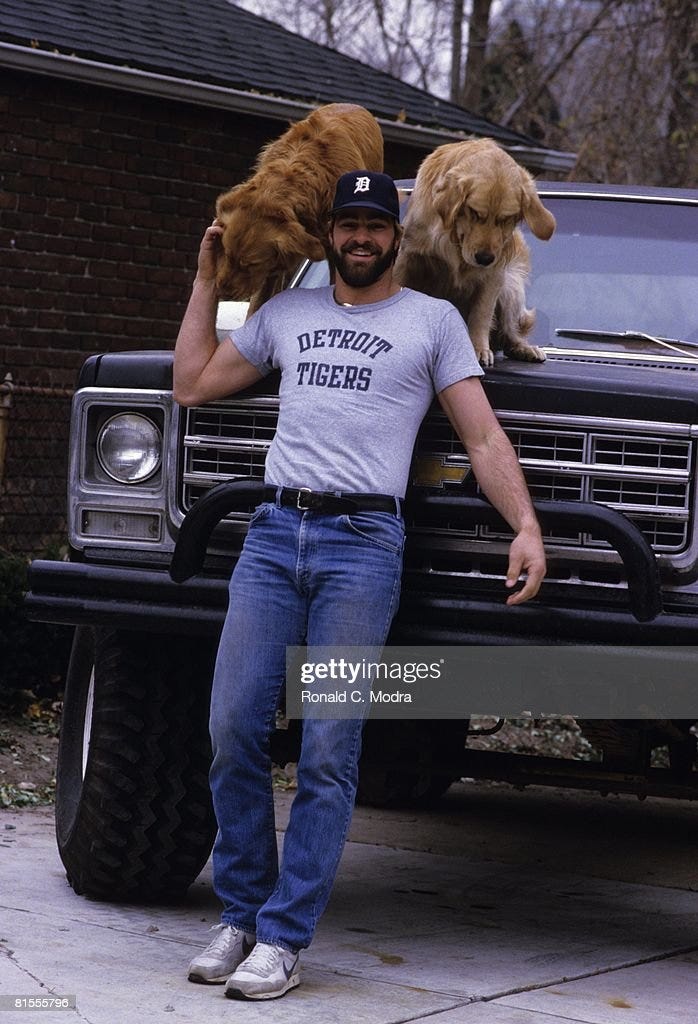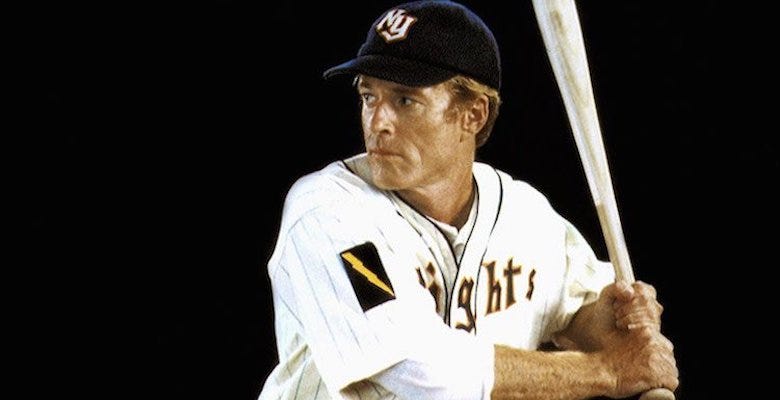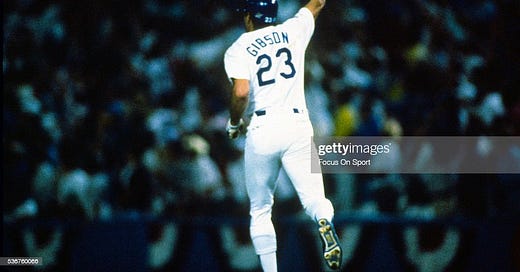You know the highlight reel.
The one that precedes practically every Major League baseball game, especially come playoff time. A century of baseball’s greatest hits, the moments that make us sit up in our seats and remind us how exciting the game can be, often backed by the soundtrack of legendary broadcasters on the call.
Kirby Puckett launching a walk-off home run to send the 1991 World Series to a decisive Game 7.
Joe Carter walking off the 1993 World Series with an epic home run in Game 6.
Bobby Thomson’s “Shot Heard ‘Round the World” to win the Giants the 1951 NL pennant over the Dodgers at the Polo Grounds, if you want to reach back well before the PBN Era.
A lot of them are walk-off home runs. That’s just the nature of the sport. But not all of them.
You could include Cal Ripken Jr. taking a lap around Camden Yards after breaking Lou Gehrig’s ironman mark. Or maybe Pete Rose passing Ty Cobb’s all-time hit record in 1985. (You can bet that Pete puts that one on the list. Sorry, couldn’t help myself.) Maybe you go more for moments of pure athletic splendor, like Bo Jackson throwing out Harold Reynolds from the Kingdome wall. Or pretty much anything else Bo ever did on the baseball diamond.
And we all have our personal highlight reel, which may or may not resonate to a large-scale audience. Although, that doesn’t make those moments any less meaningful to us. (As a small market KC fan, I’m used to my most cherished memories being marginalized by the national media.)
For me, it would be George Brett going yard twice against Toronto in Game 3 of the 1985 ALCS, and Darryl Motley starting the fireworks in Game 7 of the World Series. And more recently, Salvador Perez’s shot down the third base line to beat the A’s in the 2014 AL Wild Card Game, followed closely by Eric Hosmer’s mad dash home to tie Game 5 of the 2015 World Series. I’d also have to include Alex Gordon’s epic home run to tie Game 1 of the same World Series, sending it to extra innings and setting the stage for Kansas City’s first championship in thirty years. (You get the idea, I’m a Royals fan.)
But if I had to objectively choose one moment as the single greatest baseball moment in my lifetime, I don’t think there’s any way around it. It has to be Kirk Gibson’s walk-off home run against Dennis Eckersley to win Game 1 of the 1988 World Series.
Keep in mind, the key words here are in my lifetime. I’m aware that there are many other comparable moments in baseball’s long history, but sometimes you just gotta see something live with your own eyes for it to have the maximum impact. If you’re older than me, or even if you’re not, and you have an opinion that there’s a better moment out there, start your own newsletter. (Or leave your suggestion in the comments.) I’m rolling with this one.
Kirk Gibson is not an obvious hero for one of baseball’s greatest moments. Growing up, I thought he looked more like one of my dad’s farmer buddies than a premier athlete. He had the mustache, and especially later in his career, his knees were probably in even worse shape than theirs. It wouldn’t have been hard to picture him leaning against the bed of a truck in our driveway, throwing back a few beers and talking about whatever my dad and his friends discussed in such moments.

But looks can be deceiving. Gibson was a premier athlete. In addition to playing seventeen seasons in the big leagues, he was also an All-American wide receiver at Michigan State. In fact, he’s a member of the College Football Hall of Fame, and was drafted by the NFL (St. Louis Cardinals— 7th round, 1979), though he ultimately chose baseball.
This turned out to be a smart decision, even if he never fully got the respect he deserved. He has one of the most unusual resumes of any big league star that I can think of. The man was a leader on two World Series champions, the 1984 Detroit Tigers and 1988 Los Angeles Dodgers, won an NL MVP in 1988, and was the ALCS MVP in 1984. And yet, he never played in a single All-Star Game. How is that possible? Was he a slow starter? Did he not look the part enough to win the fans’ votes? Surely the players and coaches should have acknowledged his abilities and selected him to a bench role?
His career numbers might not be Hall of Fame worthy, but they’re still impressive enough in their own right.
In a way though, that makes what Gibson accomplished even more impressive. It’s one thing when Babe Ruth calls his shot and delivers. He’s arguably the greatest player of all-time. He’s supposed to do that kind of stuff. Gibson was not the greatest. Very good, but not the greatest. But when it counted the most, Gibson came through. If that isn’t encouraging to all of us Joe Schmoes out there, then I don’t know what is.
Nor was this the only time Gibson came through on the biggest stage. He had a very similar moment in Game 5 of the 1984 World Series, when he launched a mammoth dinger off future HOFer Goose Gossage, propelling the Tigers to the crown. Gossage, who had dominated Gibson up to that point in his career and felt very confident in the moment, later admitted in his Hall of Fame speech that he should have walked him.
But 1988 was a different animal. Despite having the best season of his career and winning the NL MVP, this was not peak Gibson. Coming over in free agency, he helped turn around the Dodgers that season, leading them to an upset victory over the heavily favored Mets in the 1988 NLCS. Gibson was fantastic in that series, only missing out on the NLCS MVP because of Orel Hershiser’s dominant performance on the mound, but it took a toll on his body. He entered the 1988 World Series a hobbled man.
This did not bode well for the underdog Dodgers. Their opponent was one of the best baseball teams I’ve ever seen. The 1988 Oakland A’s won 104 games and ran away with the AL West by 13 games. They swept the Red Sox in the ALCS. Jose Canseco led the majors in HRs, Dennis Eckersley led the league in saves, and Dave Stewart tied for the AL lead in complete games with 14. Oh yeah, they also had Mark McGwire, Dave Parker, and Dave Henderson, among others. About the only thing the Dodgers had going for them was that the A’s wouldn’t trade for Rickey Henderson until the following season.
No one gave the Dodgers much of a chance, but Game 1 started out promising enough. Mickey Hatcher hit a 2-run HR to give them a 2-0 lead in the bottom of the first. Unfortunately for them, Canseco blasted a grand slam in the top of the second, quickly taking the lead back for the A’s, 4-2. In the bottom of the sixth, Mike Scioscia singled in a run to cut the lead to 4-3. That’s where things stood as the game entered the bottom of the ninth, and A’s manager Tony La Russa sent out his closer, the virtually unhittable Dennis Eckersley.
Throughout the game, Gibson had been watching on TV in the Dodgers clubhouse while receiving physical therapy on his battered legs. When he heard Vin Scully comment that he was nowhere to be seen, he made a point of informing Dodgers manager Tommy Lasorda that he was available to pinch hit. That moment came in the ninth.
Eckersley retired the first two batters he faced, popping up Scioscia and striking out Jeff Hamilton. Pinch-hitter Mike Davis stepped up to the plate with the pitcher due up next. Lasorda put Dave Anderson in the on-deck circle, so as not to give away Gibson’s availability.

The legend around this play suggests that Oakland catcher Ron Hassey told Eckersley to walk Davis to get to the weak-hitting Anderson, but Hassey has long called BS on this, pointing out that they would never intentionally walk the tying run to bring the winning run to the plate in a one-run ballgame. The argument makes sense, and I tend to believe Hassey.
But Davis was a former teammate of Eckersley’s in Oakland, and the reliever knew that he was dangerous at the plate, so he was careful. Davis drew a walk, and Lasorda sent Gibson to the plate, much to the surprised crowd’s delight. I’m sure his hobbled gait didn’t inspire much confidence, but Lasorda just hoped that Davis could steal a base and Gibson could somehow muscle something past the infield to drive him in and tie the game.
Gibson promptly fouled off the first two pitches and fell behind 0-2. He didn’t look like he had much left in the tank, but now that he had him on the ropes, perhaps Eckersley turned overly cautious. (Or perhaps not, considering the end result.) Gibson worked the count full, drawing three straight balls. On the third one, Davis stole second, putting the scenario Lasorda was hoping for in play.
Gibson stepped out of the box and took a deep breath. (Though I’m in favor of the new pitch clock rule, it is fair to wonder if one of the greatest moments in baseball history would have happened if he hadn’t had this option.) He was thinking of the scouting report he’d been given on Eck. With a 3-2 count on a left-handed batter, the closer was damn near certain to throw a backdoor slider.
That’s exactly what he did. Gibson was ready for it. Putting all of his upper body into his swing, he launched the ball over the right field fence, winning Game 1 against the A’s, 5-4. The crowd went nuts as Gibson limped around the bases, pumping his fists in celebration like a frat boy who just successfully pulled off a keg stand.
Actually, everybody went nuts, including the announcers. On television, the iconic Vin Scully launched the moment into baseball lore, declaring, “High fly ball to right field…she is gone. (Pause to let the audience soak in the sight and sounds of the ballpark.) In a year that has been so improbable, the impossible has happened.”
Although many argue that Jack Buck’s radio call was even better. “We have a 3-2 pitch from Eckersley. Gibson swings, and a fly ball to deep right field. This is gonna be a home run. Unbelievable. A home run for Gibson. And the Dodgers have won the game, 5-4. I don’t believe what I just saw! I don’t believe what I just saw! Is this really happening, Bill? One of the most remarkable finishes to any World Series game… a one-handed home run by Kirk Gibson and the Dodgers have won it 5-4. And I’m stunned, Bill. I have seen a lot of dramatic finishes in a lot of sports, but this one might top every other one.”
Perhaps even more remarkable, this was the only at-bat for Gibson in the entire World Series. Way to make it count, Kirk. The tone was set, and the Dodgers whipped the heavily favored A’s in five games, behind the dominant pitching performance of World Series MVP Orel Hershiser and the momentum created by Gibson’s unreal game winner.
When he returned to his locker to field postgame questions from reporters, Gibson found that Dodgers bullpen coach Mark Creese had taped “Roy Hobbs” over his name plate, referencing the movie “The Natural” and the Robert Redford character’s iconic home run. The reference was appropriate. It felt like the kind of thing that could only happen in a movie.

But it was even better than that. I think that’s what people who don’t follow sports fail to understand about their appeal. Don’t get me wrong. I love books and movies. (I’ve even tried my hand at writing a few.) But everything about them is ultimately manufactured. That doesn’t necessarily take away from their power, but it is an inescapable fact. Whether you want a happy ending or you prefer something more realistic where everything isn’t tied up in a neat little package, it’s all up to the whim of the creator.
Baseball (and all sports really) are different. They’re a true gamble. Happy endings are rare, and the good guys often don’t win, but when they do, those victories are truly earned. They sometimes even manage to remind us that miracles can come true, and that life can be ecstatic, even if only for a moment. And it doesn’t matter if those moments don’t last and are frequently overtaken by piles of heartbreak. The important thing is that those moments exist at all. In that respect, baseball is a great microcosm for life in general.
Of course, all of that is a gross oversimplification. Good guys and bad guys are often relative terms, especially in sports, and perspective matters a great deal. As a kid who adopted the A’s as my backup team in the late 80’s, I certainly didn’t look at Gibson’s home run as a triumphant moment. In fact, I held a grudge for a long time. Seeing him pumping his fists before every game or while the credits rolled after This Week in Baseball sickened me. As far as I was concerned, he spoiled the A’s rightful championship.
Obviously, I’ve gotten over it. The A’s winning the title the following year helped. So did Gibson’s short tenure as a Royal in 1991. But maturity and perspective did most of the heavy lifting.
There’s that word again— perspective. It looms heavily over the question of baseball’s greatest moments. By nature, there are always two sides to every baseball game. And while it is certainly possible to objectively appreciate the beauty of baseball’s greatest moments, regardless of what side you’re on, there’s no denying that it hurts when it comes at your expense. That is why next week we’ll flip to the other side of the coin and explore baseball at its cruelest.
Because, for better or worse, you can’t have one without the other.
Thanks for reading Powder Blue Nostalgia. Was Gibson’s HR the greatest baseball moment you’ve ever seen? Got something you think tops it? Leave your choice in the comments.





Thanks Patrick!
Fun read about "The" moments when someone became a hero & stepped up. They are highlights we will never forget! Take care.
By the way, are you still in the KC area? Or living elsewhere now?
Because of the sheer improbability of it, Bill Mazeroski’s home run in Game 7 to beat the Yankees in 1960 would garner some votes.
For a full game, my favorite is Bob Gibson in Game 1 of the ‘68 Series.
But, your column, your vote. Besides, you surely are a much better writer!